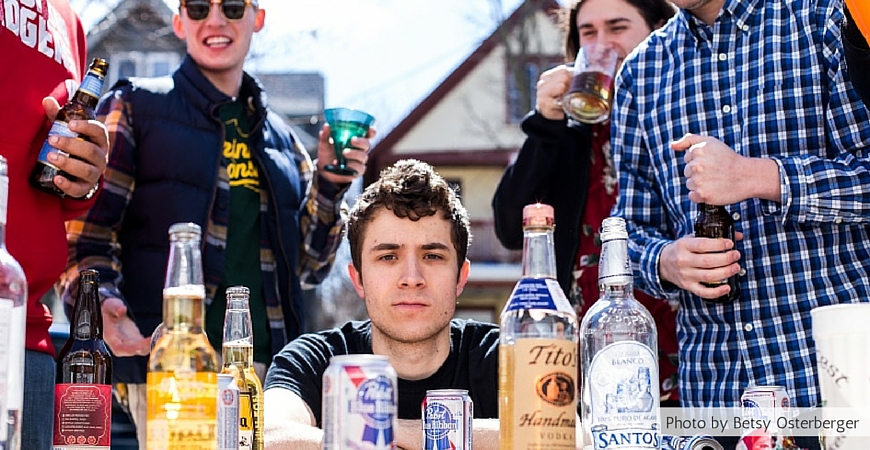[vc_row][vc_column width=”2/3″][vc_column_text css=”.vc_custom_1512175993358{padding-bottom: 15px !important;}”]Jonah Beleckis is a senior at the University of Wisconsin – Madison and he doesn’t drink alcohol. Here is the story the letter he wrote to the editor titled, “UW-Madison Alcohol Culture Alienates Non-Drinkers.”
Hello, my name is Jonah.
Invariably, when I introduce myself at weekly recovery programs I am greeted with a chorus of “Hello Jonah,” from a group united by our challenges coping with friends or family who have alcohol problems.
I go because I am a senior at UW-Madison who is a non-drinker.
Friends old and new ask all the time why I don’t drink.
“It’s just a personal choice,” “I never have,” “I have a bad family history,” I usually respond.
I rarely ever tell people—even my closest friends—what the answer really comes down to.
I’m terrified alcohol would take my life away.
My great-grandfather is mostly responsible for bringing addiction to the gene pool on my father’s side. Nine of his 13 grandchildren became alcoholics. Most 20th century families descended on my mother’s side have struggled with drugs or alcohol.
Genetics aren’t everything, but they contribute to about 40-to-60 percent of somebody’s risk of addiction, according to Joseph Glass, an assistant professor in the School of Social Work.
Luckily, I grew up in a sober household, without having to confront alcohol.
Then I came here.
While UW-Madison’s drinking culture was never a secret, I didn’t know it was celebrated.
Wisconsin is the No. 1 binge drinking state in the country, which for many is a point of pride.
When professors make playful jokes about our wild weekend shenanigans, I smile—uncomfortably. When 14,000 students around me at Camp Randall are saying, “We! Want! More! Beer!” I close my eyes and wish I could disappear. When people who don’t know me expect high fives at 2:30 a.m., I oblige—there are better battles to fight.
My private skirmishes began my first freshman weekend. I went to a house party where a cup of whatever was $5, which I would soon learn is standard in college. My friend and I weren’t drinking, and after we informed the makeshift bouncer, he scoffed as if his bravado were up to peer review and asked me, “Why would you come to a house party and not drink?” I bit my tongue and paid for an empty cup. We all make sacrifices to be accepted, right?
Fifty percent of UW-Madison’s undergrads are labeled as “high-risk drinkers,” according to University Health Services Alcohol and Other Drug Prevention Coordinator Reonda Washington. The American College Health Association defines “high-risk drinkers” as if you have had five or more drinks in one sitting within the last two weeks.
Here come the “it’s college” clichés. Except other UW-System schools reported at 35 percent. The national average was 36 percent.
Washington had a few ideas as to why UW-Madison’s high-risk drinking rate was 14 percentage points above the national average. One was our drinking culture. She also mentioned access.
According to Washington, as of last July there were 206 places students could get alcohol within a 3-mile radius outside of campus, with one side of that radius being a lake. Eau Claire has 64 in the entire city.
The drinking culture at UW-Madison is, at times, overwhelming to me. It can trigger the worst of my anxieties. I know I’m not by myself, but some nights at Wando’s or Nitty Gritty—where I barely have room to move—are where I feel most alone.
People tell me I don’t need to drink because I’m fun without getting drunk. This swells my feelings of alienation.
Research into the expectancy effects of alcohol illuminate the role our culture plays in the perceived connection between “drinking” and “fun.” People act more fun with alcohol because they think that’s what should happen, not entirely because the alcohol makes them do it. Diet Sunkist can bring out my most embarrassing dance moves, and it’s probably not due to the Aspartame.
On the other side, to many, the absence of alcohol equals the absence of fun.
“You’re not going out tonight? Why don’t you try and be fun? Why are you so boring?”
In this environment, and in many others, alcohol is treated as good. I question that. I, in no way aim to condemn everyone who drinks, but I do ask for people to listen and be aware that something that may permeate society is not unequivocally good.
How do we all reconcile that each year more than 600,000 students age 18-24 are assaulted by another student who has been drinking? That 90 percent of acquaintance rape and sexual assault on campuses involves the use of alcohol by the assailant, victim or both? That many surveyed UW-Madison students of color reported conscious attempts to avoid State Street and Langdon Street for fear of harassment?
How am I supposed to reconcile that alcoholism wrecks families, that lives are over before they even start?
I know alcohol does not make someone commit these crimes. But can you really say it’s not a factor?
I’ve come to a point where I see there are people, good people, who can control their drinking behavior. And there are other people, also good people, who cannot. Not everyone fits the conception of an addict, someone who is “lying in the street, [who] smells like alcohol and is in the gutter,” as Glass explained.
Respect each other’s limits and respect each other’s differences. College life is not all party and bullshit. I’ve said no to a drink many more times than I’ve Jumped Around. I believe there are others on this campus who choose to say no, who might even have a harder time saying no.
For today, I’m not biting my tongue. I’m writing this for those people who may struggle as I do with UW-Madison’s drinking culture, who might want to know they are not alone.
For me, every day is a fight. I have grown toward appreciating the sweet taste of Sunkist instead of the common alternative, one much more bitter in taste.
There will be another note waiting, scrawled on my mirror next Friday, and the one after that. And I don’t know if it will ever get me.
Hello, my name is Jonah. Is anyone else out there?
[/vc_column_text][/vc_column][vc_column width=”1/3″][vc_single_image image=”3745″ img_size=”large” alignment=”center” onclick=”custom_link” img_link_target=”_blank” link=”http://eepurl.com/daOGbr”][vc_video link=”https://www.youtube.com/watch?v=jgUdZQ8hIuk&t=3s” align=”center” css=”.vc_custom_1512176016486{margin-top: 20px !important;margin-right: 20px !important;margin-bottom: 50px !important;margin-left: 20px !important;}” title=”Videos”][vc_single_image image=”3742″ img_size=”large” alignment=”center” onclick=”custom_link” img_link_target=”_blank” title=”Facebook Group” link=”https://www.facebook.com/groups/1476425295726770/”][vc_column_text]
[/vc_column_text][/vc_column][/vc_row]
